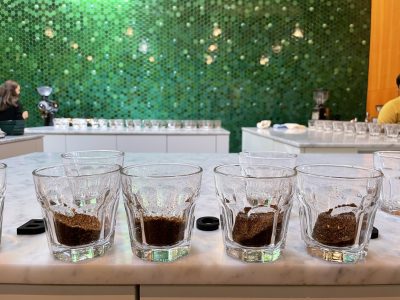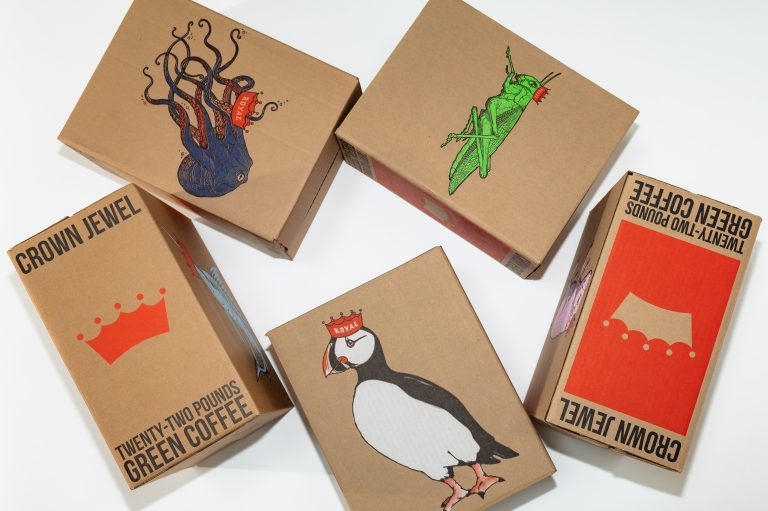We are updating this blog entry weekly. Last update was April 13th, 2020.
These weeks have been a whirlwind, but we’ve managed to keep coffee flowing in and out of our warehouse and handle QC responsibilities, albeit with a skeleton crew to minimize contact points among our staff. We thank those of you who have reached out with concern for our team. You can check updates about Royal and The Crown teams here.
As always, we continue to honor our contracts with producers and exporters. During this time we are doing our very best to understand the added challenges they face. Many farmers around the world depend on coffee as their main income, and the coffee plants cannot not wait to be cared for, or harvested. We applaud and value their hard work to keep the industry flowing during these unprecedented times.
We also sympathize mightily with the many retail workers who have been laid off and the roasters having to make very difficult business choices. Please know that if you are struggling, we want to hear from you so that we can help develop a plan to get everyone through this.
Below are some supply chain updates from the past month:
April 13th
Reports of shipping companies idling container vessels in Pacific waters in the face of a slowdown in global trade. Chinese factories, while operational again, are only at 80% capacity. It can take a ship several weeks to come back into service once idled. A single vessel can hold 15,000-20,000 containers so a reduction in capacity will lead to further constraints on forward availability, and more delays seem inevitable.
April 2nd
As of April 2nd, we are starting to see vessel miss their transshipments, pushing back arrivals even further. On average we are now seeing delays of around 3 weeks from Central America, for coffee that is already on the water. It is likely that coffees scheduled to ship this week and next will face longer delays.
March 19th
On March 19th, the Port of Houston shut down after a worker tested positive for the virus; however, by the next day they had already started operating again after specific workers were quarantined. This speaks to the interconnectedness of the world. Having even one major port shut down for an extended period could gum up the entire global network as container shortages and vessel availability slows. It is clear that anyone who handles containerized freight (like Royal, or any of our warehouses) has to be considered essential if the global supply chain is to remain functional.
Honduras and Peru
Marcala, Honduras remains blockaded. Other areas of the country are operating under the same curfews and restrictions as they have in the last couple weeks. Honduras and Peru have kept their ports operational, despite persistent rumors to the contrary; however, they have drastically reduced internal movement and the issuance of necessary export permits due to office and road closures, so they are functionally shut down. Quarantine in Peru started March 16th. Peru is in lockdown, which bans coffee growers and pickers from leaving their house, until April 26th. This is hugely problematic as the harvest in the lower altitude areas is set to begin any day now. Cooperatives and exporters have appealed to the government for exemptions, but as of now coffee is considered non-essential. Without some resolution, cherries will go unpicked and the overall Peru harvest could be massively impacted. Honduras is right in the middle of their shipping season. With 5 million bags a year to move, this is a major hit to general availability and is being reflected in an inversion of the forward carry curve in the C market (basically, nearby coffee is expensive).
Run On SPOT Coffee
As a result of the above, we are seeing a run on SPOT coffee. Stocks are being bought up, and anything physically available or on the water is going to be at a premium. It behooves any buyer to strongly consider what they actually need right now, and what they can afford to wait on. Waiting, while nerve racking given the uncertainty of the virus, may very well result in significant cost savings compared to highly inflated SPOT prices. With that said, you can’t roast what you don’t have. We advise a minimum of 3-4 months of your coverage be physically in the country now, or on the water. As of the end of March 2020, the C market has slipped out of inversion, but the forward curve remains relatively flat. It is clear, however, that the overriding concern of the trade is now who will buy all this coffee, more so than when is it going to get here.
Update April 13th: C market volatility has eased up dramatically. Prices have traded in a fairly tight range, up around 10% since the start of the crisis. The forward carry curve remains flatter than we’d typically see, but some of that is attributable to interest rates at near 0% around the world. Colombia and Guatemala differentials are very firm, as high as they’ve been in the past decade. Coffee does continue to trade and ship. Guatemala is at the end of their crop year, Colombia is just beginning.
Colombia and Brazil
Colombia and Brazil are both seeing delays in shipments unrelated to the virus. These began back in January and February due to tight internal markets but have been exacerbated since by slowdowns due to COVID-19. We are well provisioned on both, but should you require Colombians for the May-July or Brazil for Aug-Sep windows it would be smart to get those taken care of now.
Africa
Mercifully, Africa has been spared so far by the brunt of the crisis, though both Nairobi and Addis, along with the Mombasa and Djibouti ports, are operating under curfews. The main concern here is that the virus be kept out given the healthcare infrastructure, and most countries are closing their borders to foreigners and restricting travel generally. There is also some concern around container shortages, as even in good years this tends to be an issue at Nairobi dry port and Mombasa.
- Kenya: As of Wednesday, March 25th, all international flights will be suspended, with the exception of cargo flights. Schools, universities and bars have been closed. Shipping lines out of Mombasa remain ok for now, however, we expect major shipping lines to reduce their scheduled calls. Food grade containers are becoming scarce, although we do not foresee any major delays at this point.
- Tanzania: Schools and universities remain closed, international flights allowed with compulsory 14-day quarantine. Dar es Salaam port remains congested with vessels taking an average of 10-15 days to berth after ETA.
- Rwanda: Borders are closed, international travel is not permitted and only essential shops and markets are operating. At the farm level, cherry picking is just starting with small volumes.
- Ethiopia: Flights are suspended, so courier services sending preshipment samples are no longer operating. Royal has already approved dozens of Ethiopian preships, but there are still quite a few more to go. Haile, our Royal employee based in Addis, will be approving the lots we’ve already cupped in order to keep business flowing.
Papua New Guinea
Papua New Guinea (PNG) has also suspended flights, so courier services sending preshipment samples there are also no longer operating. PNG season does not start until May, so there is hope that service could resume in time. We expect other countries to follow suit, particularly in more remote areas where couriers rely on commercial air carriers rather than their own planes.
Indonesia
In Sumatra, cherry prices and FOB offers have declined 30-40% over the past several weeks as a lack of demand takes hold just as the main crop season begins in the northern areas (Takengon, Lintong). Unfortunate as Indonesia has experienced virtually no interruption of shipments from Covid, but the cup profiles make it a difficult coffee to substitute.
India
As of April 12th, Indian has begun to reopen port operations slowly with special dispensations from the government. On March 25th, India announced a total lockdown for 21 days, including all port and rail operations. India is not actually a major port of call for vessels coming to West Coast from Africa, but having port operations suspended anywhere will reverberate throughout the system in terms of container and vessel availability.
We will continue to keep this post updated with the latest developments affecting the specialty coffee supply chain.
-Max Nicholas-Fulmer
CEO
Royal Coffee



Thanks for the update Max, This is very helpful!
I don’t typically comment on posts, but as a long time reader I thought I’d drop in and wish you all the best during these troubling times.
From all of us at Royal CBD, I hope you stay well with the COVID19
pandemic progressing at an alarming rate.
Justin Hamilton
Royal CBD